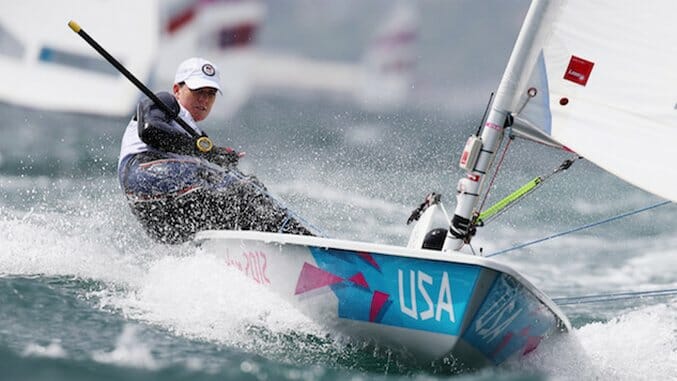Olympics Interview: U.S. Sailor Paige Railey
Photos courtesy Getty Images
Paige Railey isn’t the only sailor in her family. She’s not even the only Olympian. Brother Zach, who got his start in the sport a few years ahead, is a 2008 silver medalist in the heavyweight dinghy. And then, in London, the two got to walk together at the Opening Ceremony, while the rest of the family cheered them on.
This year, though, Paige is the only Railey competing in Rio. Today, she’s racing in the laser radial — a small (and fast) one-person boat that requires her to do everything herself—competition in Rio de Janeiro’s Guanabara Bay.
The 29-year-old, who took second in the world championship event earlier this year, has been named sailor of the year in the past. Her family is so close that Zach and Paige, along with Paige’s twin sister, own a high water company out of their Florida home base. And when she’s not selling sandbags or buckets for sailing, training for the Olympics, or raising money, Paige competes in Ironman triathlon just for the fun of it — even when it means having to recover from a devastating bike crash.
Paste caught up with Railey between training trips to Rio.
How does someone even get into sailing in first place?
My dentist recommended to my parents to do a ‘learn to sail’ program, a summer camp, when my brother was eight, and Zach fell in love with it. I was five years old at the time and I have a twin sister too, so we had to wait three years to join the program.
How do you go from there, from a summer camp, to being really competitive? Do you have to buy your own boat as an eight-year-old?
No, no, the club had boats for us, which was great. Then we used hand-me-down stuff for a long time.
There really is a path set out in front of kids, so they start in the same boat and they have alternatives, they can do the solo or with another person, when they get too big or too old for the beginner boat.
And you decided you wanted to do the sailing alone?
Yeah, I decided to do the sailing alone thing. I tried it with my twin sister and it didn’t work out. I just enjoyed being in the boat all by myself, making decisions. I was eight years old, all by myself, in a boat alone, that’s pretty crazy. I really enjoyed that kind of freedom.
-

-

-

-

-

-

-

-

-

-

-

-

-

-

-

-

-

-

-

-

-

-

-

-

-

-

-

-

-

-

-

-

-

-

-

-

-

-

-

-








































